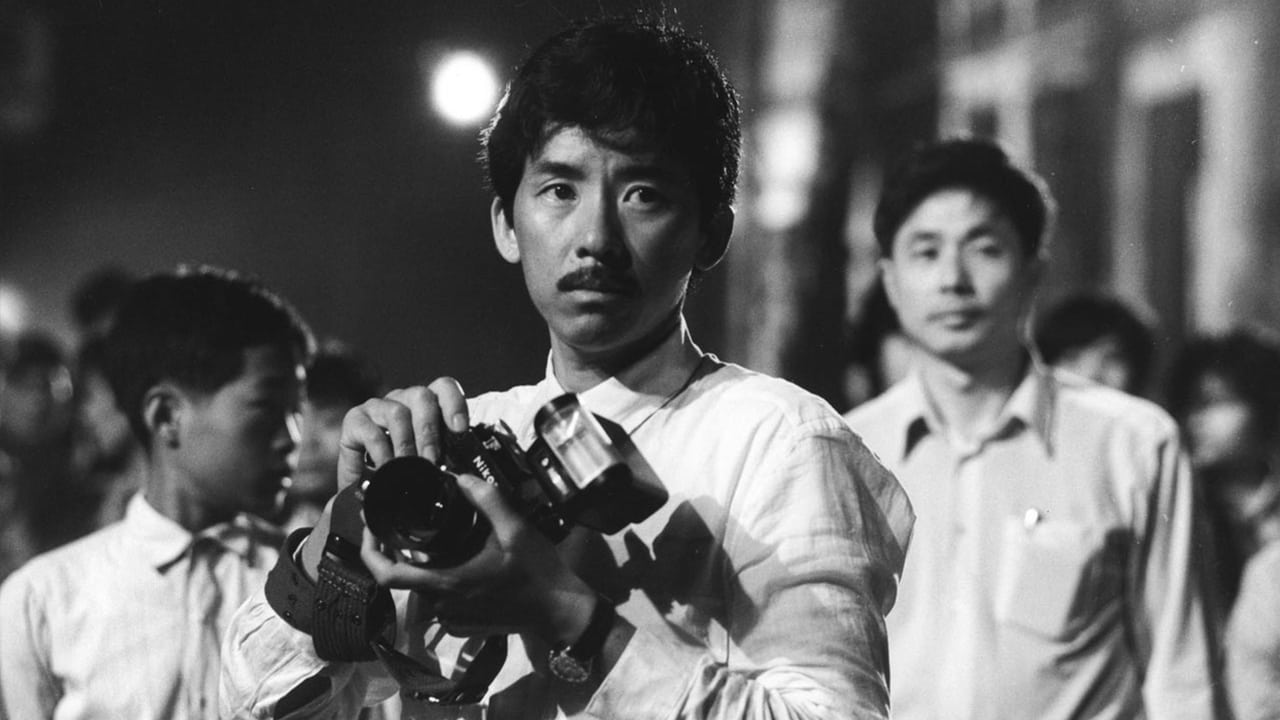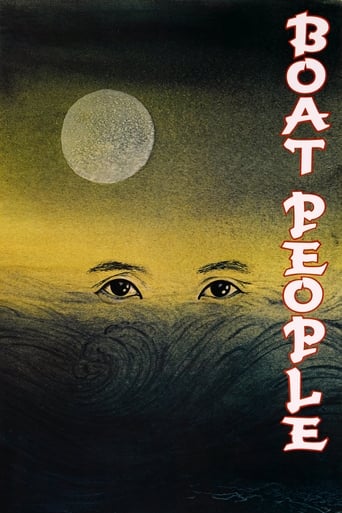



Disappointment for a huge fan!
I was totally surprised at how great this film.You could feel your paranoia rise as the film went on and as you gradually learned the details of the real situation.
View MoreI have absolutely never seen anything like this movie before. You have to see this movie.
View MoreThis movie feels like it was made purely to piss off people who want good shows
View MoreIn celebration of Ann Hui's record-breaking 5th win of BEST DIRECTOR in HONG KONG FILM AWARDS for her epic THE GOLDEN ERA (2014), which is also the eventual recipient of BEST PICTURE, it is an opportune time to track back her first win at the age of 35 for her fourth feature BOAT PEOPLE, which has established her as a pioneer in the New Wave movement of Hong Kong Cinema.One requisite notion before watching this film is that the whole account is as fictional as in the movie where the entire Vietnamese populace including our Japanese protagonist, Shiomi Akutagawa (Lam), all speak fluent Cantonese. In fact, the script is a purely fabricated by the screenwriter Kang Chien Chiu, at a time when Hong Kong people were uncertain of their future and for fear of the social overhaul if Chinese Communist Party would eventually take over the colonised financial hub. Chiu's anti-communist slant is the elephant-in-the-room although Hui has tried to sidestep the politics-sensitive issue by emphasising that the film is more focused on personal struggle under the extreme circumstances.Shot in Hainan island of China as a stand-in for a tropical Ho Chi Minh City, Shiomi is a Japanese photography who has been granted a license to shoot the new life of Vietnamese people under the government of Communist party after the Vietnam War. The commencing flourishing impressions are disrupted when Shiomi decides to roam the city alone without the company of the bureaucratic officials, soon, he is attracted by an impecunious girl Cam Nuong (Ma) on the street, who has two younger brothers and a sick mother (Hao) to raise. Slowly Shiomi realises all his previous photo-shooting visits are the front arranged with the government to give a grand veneer for foreigners, the harsh reality stuns Shiomi, he witnesses extreme poverty, the utter disregard for human life and death can happen anytime anywhere, no one cares, the poor refuses to be relocate to the so-called "new economic district" because young men are violently man-handled to manually remove land mines under cruel administration from the authorities. Disillusioned and unsettled by the darkness and savagery, Shiomi decides to help Cam Nuong and his younger brother flee from this country, but the sacrifice might exceed his expectation.The film doesn't recoil at the blood-letting casualties, and the intensity of waiting for a land- mine to explode at any moment is excruciatingly taxing, although Hui doesn't intend to let those scenes to be too startling with long cues as a ballast. The murky and repressing air engulfs lives without hope, except fro Cam Nuong, she is precocious but has yet been contaminated by the vice around her, sincere laughters can still burst out between her and Shiomi, Season Ma injects a spirited purity and spunky pizazz into Cam Nuong in her career-debut performance. George Lam exhibits an affable persona as an outsider involuntarily elevated to be a true hero with unyielding ethical virtues.This is also Andy Lau's screen-debut too, the subplot around him can evoke quite a harrowing weep. Cora Miao, who play's a 40-year-old mistress using her body as the leverage of survival under the tumultuous situation, configures a mesmerising presence with intriguing back-stories left unfinished. Mengshi Qi is Nguyen, the bureaucrat who finds a camaraderie in Shiomi, represents both the executioner and the victim of the government, his poetic reflection "The revolution of Vietnamese is successful, but my own revolution fails" - narrated beautifully with a golden sunset in the background. The production looks a bit dated by today's standards, and certain editing hiccups are rather noticeable but if we can be impartial to the story's pejorative nature regarding to the Communist regime, the film is a well-considered ode to humanity and altruism when it is urgently needed, also more remarkably, it would be an impossible task for Ann Hui to get a green light under today's cinematic weather neither in mainland China nor in Hong Kong.
View MoreA Japanese photographer returns to Vietnam three years after documenting its 'liberation' and becomes increasingly involved in the fate of a young girl and her family. It is a time of poverty, violence and death.There are many deaths in this film and the majority of these deaths are graphically depicted. One of the least explicit, but perhaps the most moving, occurs on a scrap heap surrounded by a body of filthy water. While the young victim's blood is still flowing out, his peer runs the length of the heap bearing a standard, his identity and the colours of the flag rendered anonymous by the remote camera angle and the silhouette produced by the setting sun. The boy lays the flag over the body with a timeliness and purpose that implies he is always ready for such tragedies. It is one of the film's most striking images, calling to mind such questionable iconic images as the flag-raisers of Iwo Jima.Such readings are possible over much of the film. Director Ann Hui's 'vérité' camera calls to mind Altman's M*A*S*H, as does her treatment of violence and its bloody consequences - something which contrasts with the comic book violence of later 80s Hong Kong films (with which many people are more familiar). Comparisons could also be made with Kubrick's use of zoom (though M*A*S*H has this too) and formal composition, with characters placed in the centre of frame as if being interviewed for live television. Kubrick, of course, would later direct his own Vietnam masterpiece, Full Metal Jacket.Comparisons could even be made with Francis Ford Coppola's Apocalypse Now. Coppola's helicopter sequence filmed in the Philippines shares a lot with Hui's remarkable opening shot of tanks driving through the streets of Hainan, China (both standing in for Vietnam). However, where Coppola tended towards using the imagery of Vietnam to attain a greater artistic goal, Hui would be discredited for receiving any such reading. Where the sound of Coppola's napalm explosions bring a certain excitement and satisfaction to the viewer, the gunshots heralding executions and the chance for children to pillage the corpses has an entirely different motive and effect.One of the film's strengths is that, while it plays with, even exploits some well-established grammars of film making - tragedy, documentary, romance - it never defers to a single one. The film works on each level equally well. It is a well-told story: excellently paced and genuinely compelling right up to the end credits. At the other end of the spectrum, it is perhaps the boldest and most unflinching criticism of the brutality and hypocrisy of communist states to come out of a small island that would, 17 years later, become a Special Administrative Region of such a state.The film has elements of curiosity. One can accept for purely practical reasons the need for Cantonese to be the common language of Vietnamese and Japanese characters. It is harder to understand why a Japanese man (played by a local Hong Kong actor) should be the main protagonist, especially considering the film's political overtones. Does he represent objectiveness or irony? Perhaps there is no single answer.Despite some minor flaws, the film manages to illustrate without preaching, condescending or even aestheticising the subject, even though the dimly-lit tableaux and pitch-perfect editing combine very pleasingly for the eye. Hui works with a lightness of touch rarely seen in Hong Kong or Hollywood at that time or since and with a feminist subtext scarcely seen in her later work. This film well-deserves the acclaim with which it was awarded on its release and is sadly underrated at the time of writing. It serves as an interesting and important counterpoint to the various lavish 'magnum opuses' of American directors of that era and has an enduring relevance and importance that many young people, especially of the film's native land, would benefit from experiencing.
View MoreEvery refugee from Vietnam I know has reported incidents depicted in this film. Nobody experienced all of them, and certainly not in the film's timespan, but none of the incidents are especially far-fetched.
View More